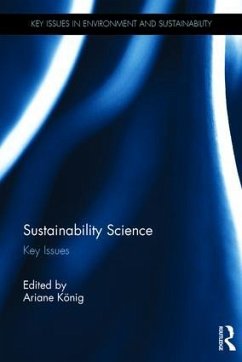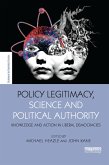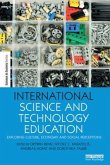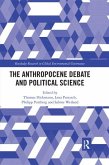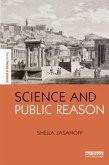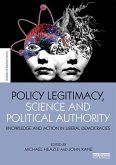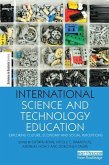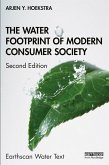Sustainability Science
Key Issues
Herausgeber: König, Ariane; Ravetz, Jerome
Sustainability Science
Key Issues
Herausgeber: König, Ariane; Ravetz, Jerome
- Gebundenes Buch
- Merkliste
- Auf die Merkliste
- Bewerten Bewerten
- Teilen
- Produkt teilen
- Produkterinnerung
- Produkterinnerung
Sustainability Science: Key issues is a comprehensive textbook for undergraduates and postgraudates from any disciplinary background studying the theory and practice of sustainability science.
Andere Kunden interessierten sich auch für
![Policy Legitimacy, Science and Political Authority Policy Legitimacy, Science and Political Authority]() Policy Legitimacy, Science and Political Authority76,99 €
Policy Legitimacy, Science and Political Authority76,99 €![International Science and Technology Education International Science and Technology Education]() International Science and Technology Education206,99 €
International Science and Technology Education206,99 €![The Anthropocene Debate and Political Science The Anthropocene Debate and Political Science]() The Anthropocene Debate and Political Science61,99 €
The Anthropocene Debate and Political Science61,99 €![Science and Public Reason Science and Public Reason]() Sheila JasanoffScience and Public Reason206,99 €
Sheila JasanoffScience and Public Reason206,99 €![Policy Legitimacy, Science and Political Authority Policy Legitimacy, Science and Political Authority]() Policy Legitimacy, Science and Political Authority206,99 €
Policy Legitimacy, Science and Political Authority206,99 €![International Science and Technology Education International Science and Technology Education]() International Science and Technology Education73,99 €
International Science and Technology Education73,99 €![The Water Footprint of Modern Consumer Society The Water Footprint of Modern Consumer Society]() Arjen Y. HoekstraThe Water Footprint of Modern Consumer Society63,99 €
Arjen Y. HoekstraThe Water Footprint of Modern Consumer Society63,99 €-
-
-
Sustainability Science: Key issues is a comprehensive textbook for undergraduates and postgraudates from any disciplinary background studying the theory and practice of sustainability science.
Hinweis: Dieser Artikel kann nur an eine deutsche Lieferadresse ausgeliefert werden.
Hinweis: Dieser Artikel kann nur an eine deutsche Lieferadresse ausgeliefert werden.
Produktdetails
- Produktdetails
- Verlag: Routledge
- Seitenzahl: 396
- Erscheinungstermin: 21. November 2017
- Englisch
- Abmessung: 240mm x 161mm x 26mm
- Gewicht: 757g
- ISBN-13: 9781138659278
- ISBN-10: 1138659274
- Artikelnr.: 57052470
- Herstellerkennzeichnung
- Libri GmbH
- Europaallee 1
- 36244 Bad Hersfeld
- gpsr@libri.de
- Verlag: Routledge
- Seitenzahl: 396
- Erscheinungstermin: 21. November 2017
- Englisch
- Abmessung: 240mm x 161mm x 26mm
- Gewicht: 757g
- ISBN-13: 9781138659278
- ISBN-10: 1138659274
- Artikelnr.: 57052470
- Herstellerkennzeichnung
- Libri GmbH
- Europaallee 1
- 36244 Bad Hersfeld
- gpsr@libri.de
Ariane König is a Senior Researcher in the Research Unit for Education, Cognition, Culture and Society at the University of Luxembourg. Jerome Ravetz is an Associate Fellow at the Institute for Science, Innovation and Society, University of Oxford.
Introduction
Chapter 1. Sustainability science as a transformative social learning
process Ariane König
Chapter 2. Flowers of resistance: Citizen science, ecological democracy and
the transgressive education paradigm Arjen E.J. Wals, Michael A. Peters
Part I. Embracing complexity and alternative futures: Conceptual tools and
methods
Chapter 3. Systems approaches for transforming social practice: Design
requirements Ariane König
Chapter 4. Cognitive pitfalls in dealing with sustainability Philipp
Sonnleitner
Chapter 5. Escaping the complexity dilemma Barry Newell, Katrina Proust
Chapter 6. Exploring alternative futures with scenarios Gerard Drenth,
Shirin Elahi, Ariane König
Chapter 7. Social technology and Theory U: Co-creating actionable knowledge
for
leadership Isabel Page
Chapter 8. Staging design-thinking for sustainability in practice: Guidance
and watch-outs Kilian Gericke, Boris Eisenbart, Gregor Waltersdorfer
Part II. What might transformations look like? Sectoral challenges and
interdependence
Chapter 9. Can ecosystem services help agricultural transitions? Nicolas
Dendoncker, Emilie Crouzat
Chapter 10. Food systems and human ecology: An overview Federico Davila,
Robert Dyball
Chapter 11. Energy: Physical and technical basics Susanne Siebentritt
Chapter 12. Urban energy transitions from innovations in green building
Julia Affolderbach, Bérénice Jung-Preller, Christian Schulz
Chapter 13. Democratising renewable energy production: A Luxembourgish
perspective Kristina Hondrila, Simon Norcross, Paulina Golinska, Vladimir
Broz, Aydeli Rios, Jules Muller
Chapter 14. Community-based monitoring for improved water governance Kim
Chi Tran, Ariane König
Part III. Tracking, steering and judging transformation
Chapter 15. Sustainability indicators: Quality and quantity Jerome Ravetz,
Paula Hild, Olivier Thunus, Julien Bollati
Chapter 16. Complex learning Sebastian Manhart
Chapter 17. Uncertainty as a key to sustainability economics Jerome Ravetz
Chapter 18. Post-Script: Heuristics for sustainability science Jerome
Ravetz
Chapter 19. Outlook: The changing relationship between citizens and science
in the Anthropocene Ariane König
Chapter 1. Sustainability science as a transformative social learning
process Ariane König
Chapter 2. Flowers of resistance: Citizen science, ecological democracy and
the transgressive education paradigm Arjen E.J. Wals, Michael A. Peters
Part I. Embracing complexity and alternative futures: Conceptual tools and
methods
Chapter 3. Systems approaches for transforming social practice: Design
requirements Ariane König
Chapter 4. Cognitive pitfalls in dealing with sustainability Philipp
Sonnleitner
Chapter 5. Escaping the complexity dilemma Barry Newell, Katrina Proust
Chapter 6. Exploring alternative futures with scenarios Gerard Drenth,
Shirin Elahi, Ariane König
Chapter 7. Social technology and Theory U: Co-creating actionable knowledge
for
leadership Isabel Page
Chapter 8. Staging design-thinking for sustainability in practice: Guidance
and watch-outs Kilian Gericke, Boris Eisenbart, Gregor Waltersdorfer
Part II. What might transformations look like? Sectoral challenges and
interdependence
Chapter 9. Can ecosystem services help agricultural transitions? Nicolas
Dendoncker, Emilie Crouzat
Chapter 10. Food systems and human ecology: An overview Federico Davila,
Robert Dyball
Chapter 11. Energy: Physical and technical basics Susanne Siebentritt
Chapter 12. Urban energy transitions from innovations in green building
Julia Affolderbach, Bérénice Jung-Preller, Christian Schulz
Chapter 13. Democratising renewable energy production: A Luxembourgish
perspective Kristina Hondrila, Simon Norcross, Paulina Golinska, Vladimir
Broz, Aydeli Rios, Jules Muller
Chapter 14. Community-based monitoring for improved water governance Kim
Chi Tran, Ariane König
Part III. Tracking, steering and judging transformation
Chapter 15. Sustainability indicators: Quality and quantity Jerome Ravetz,
Paula Hild, Olivier Thunus, Julien Bollati
Chapter 16. Complex learning Sebastian Manhart
Chapter 17. Uncertainty as a key to sustainability economics Jerome Ravetz
Chapter 18. Post-Script: Heuristics for sustainability science Jerome
Ravetz
Chapter 19. Outlook: The changing relationship between citizens and science
in the Anthropocene Ariane König
Introduction
Chapter 1. Sustainability science as a transformative social learning
process Ariane König
Chapter 2. Flowers of resistance: Citizen science, ecological democracy and
the transgressive education paradigm Arjen E.J. Wals, Michael A. Peters
Part I. Embracing complexity and alternative futures: Conceptual tools and
methods
Chapter 3. Systems approaches for transforming social practice: Design
requirements Ariane König
Chapter 4. Cognitive pitfalls in dealing with sustainability Philipp
Sonnleitner
Chapter 5. Escaping the complexity dilemma Barry Newell, Katrina Proust
Chapter 6. Exploring alternative futures with scenarios Gerard Drenth,
Shirin Elahi, Ariane König
Chapter 7. Social technology and Theory U: Co-creating actionable knowledge
for
leadership Isabel Page
Chapter 8. Staging design-thinking for sustainability in practice: Guidance
and watch-outs Kilian Gericke, Boris Eisenbart, Gregor Waltersdorfer
Part II. What might transformations look like? Sectoral challenges and
interdependence
Chapter 9. Can ecosystem services help agricultural transitions? Nicolas
Dendoncker, Emilie Crouzat
Chapter 10. Food systems and human ecology: An overview Federico Davila,
Robert Dyball
Chapter 11. Energy: Physical and technical basics Susanne Siebentritt
Chapter 12. Urban energy transitions from innovations in green building
Julia Affolderbach, Bérénice Jung-Preller, Christian Schulz
Chapter 13. Democratising renewable energy production: A Luxembourgish
perspective Kristina Hondrila, Simon Norcross, Paulina Golinska, Vladimir
Broz, Aydeli Rios, Jules Muller
Chapter 14. Community-based monitoring for improved water governance Kim
Chi Tran, Ariane König
Part III. Tracking, steering and judging transformation
Chapter 15. Sustainability indicators: Quality and quantity Jerome Ravetz,
Paula Hild, Olivier Thunus, Julien Bollati
Chapter 16. Complex learning Sebastian Manhart
Chapter 17. Uncertainty as a key to sustainability economics Jerome Ravetz
Chapter 18. Post-Script: Heuristics for sustainability science Jerome
Ravetz
Chapter 19. Outlook: The changing relationship between citizens and science
in the Anthropocene Ariane König
Chapter 1. Sustainability science as a transformative social learning
process Ariane König
Chapter 2. Flowers of resistance: Citizen science, ecological democracy and
the transgressive education paradigm Arjen E.J. Wals, Michael A. Peters
Part I. Embracing complexity and alternative futures: Conceptual tools and
methods
Chapter 3. Systems approaches for transforming social practice: Design
requirements Ariane König
Chapter 4. Cognitive pitfalls in dealing with sustainability Philipp
Sonnleitner
Chapter 5. Escaping the complexity dilemma Barry Newell, Katrina Proust
Chapter 6. Exploring alternative futures with scenarios Gerard Drenth,
Shirin Elahi, Ariane König
Chapter 7. Social technology and Theory U: Co-creating actionable knowledge
for
leadership Isabel Page
Chapter 8. Staging design-thinking for sustainability in practice: Guidance
and watch-outs Kilian Gericke, Boris Eisenbart, Gregor Waltersdorfer
Part II. What might transformations look like? Sectoral challenges and
interdependence
Chapter 9. Can ecosystem services help agricultural transitions? Nicolas
Dendoncker, Emilie Crouzat
Chapter 10. Food systems and human ecology: An overview Federico Davila,
Robert Dyball
Chapter 11. Energy: Physical and technical basics Susanne Siebentritt
Chapter 12. Urban energy transitions from innovations in green building
Julia Affolderbach, Bérénice Jung-Preller, Christian Schulz
Chapter 13. Democratising renewable energy production: A Luxembourgish
perspective Kristina Hondrila, Simon Norcross, Paulina Golinska, Vladimir
Broz, Aydeli Rios, Jules Muller
Chapter 14. Community-based monitoring for improved water governance Kim
Chi Tran, Ariane König
Part III. Tracking, steering and judging transformation
Chapter 15. Sustainability indicators: Quality and quantity Jerome Ravetz,
Paula Hild, Olivier Thunus, Julien Bollati
Chapter 16. Complex learning Sebastian Manhart
Chapter 17. Uncertainty as a key to sustainability economics Jerome Ravetz
Chapter 18. Post-Script: Heuristics for sustainability science Jerome
Ravetz
Chapter 19. Outlook: The changing relationship between citizens and science
in the Anthropocene Ariane König

